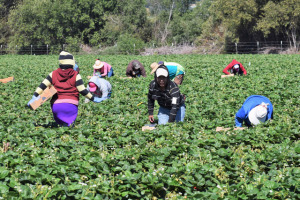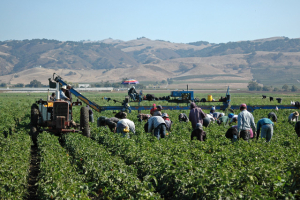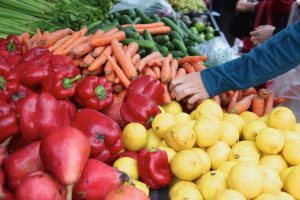
Planting Seeds For Change
September 17, 2012 Roots of ChangeA garden in every school – can you imagine that? A Bay Area community is well on its way, with impressive statistics showing that 52% of its public elementary schools have gardens. The San Mateo County Food System Alliance (FSA), a multi-stakeholder collaborative of farmers, fishermen, ranchers, environmental and public health professionals, and residents, recognizes the connection between healthy food access, nutrition, and the childhood obesity epidemic in our country. By prioritizing school gardens, supporting relevant policy, and working with parents and teachers on improving school wellness, San Mateo is contributing to a new movement that’s growing from the ground up.
What makes the San Mateo County FSA a leading example in rethinking how we look at school food? It’s the collaboration between the numerous partners in the San Mateo County FSA, which includes employees from the San Mateo County Health System (Health System). The San Mateo County FSA prioritized school gardens across the county because it believes every child should have access to environments and programs that support the “development of lifelong health and citizenship.” The San Mateo County FSA and Health System both acknowledge that without putting an effort into improving school nutrition, children remain at risk of childhood obesity and related diseases. To promote this goal, the San Mateo FSA published a Call-to-Action: A Garden in Every School. This document asks the community to make school gardens a priority, and highlights how school gardens benefit students’ health and academic achievement and encourages community involvement. The Health System and San Mateo County FSA have joined forces to present a new framework for how we think about school food. It’s not just about the meals served in cafeterias today, but it’s also about how students’ food choices affect their health now and in the future and how a community-driven project can support this change. This vision aims to create sustainable change and embodies ‘The New Mainstream’, which values a new set of norms for a localized, healthy food system.
Jennifer Gross a member of the San Mateo County FSA and employee of the Health System, has been a key player in connecting and encouraging collaboration across the county. Having seen the work firsthand, Gross shares her perspective on why gardens are part of a greater movement. The emergence of urban and community gardens is evident across the country; gardens are powerful tools for promoting education, healthy living, environmental stewardship, and social interactions that build community. The work between the Health System and the FSA is creating a healthier community by prioritizing the development of these green spaces in the county. Gross doesn’t fail to point out that while there is exciting progress being made, there are “still many challenges in communities where school food is competing with test scores and low budgets.” She believes, though, that there’s an opportunity to collaborate with community partners to help create a sustainable food system and promote economic development.” School gardens are not only teaching where our food comes from but as Gross puts it, they’re providing lessons on “how to value our land and a help us better understand why healthy food is important.” Children who participate in school gardens learn lessons about the interconnectedness of our consumption and health. The goal is to bring about an enhanced ecological understanding and sense of stewardship of both their bodies and our land.
The FSA assists schools with starting and enhancing gardens by building skills and sharing knowledge. While the FSA does not currently fund gardens, Get Healthy San Mateo County (GHSMC), an initiative of the Health System, funds environmental change projects, which typically include school gardens every year. Gardens provide an opportunity to address the obesity crisis by cultivating students who will become more informed and conscious consumers about their food choices and their environment. San Mateo’s focus on school gardens is part of a greater mission – to set the foundation for a future where individuals better understand their connection to and are concerned with how food is grown, and demand a system that responds to these concerns.
Every day we learn about individuals and communities like the San Mateo County FSA that value knowing where their food comes from. Similar to the FSA, they go beyond teaching nutrition or how to grow their own food; they emphasize how the elements of our food system intersect. The story of San Mateo County and their community efforts show us how we can rethink education, health, and community to define a ‘new mainstream in food and agriculture’. It’s great to see how a better future for our food system is being realized in different yet equally momentous ways across the state.
 Juliana Rodriguez is a rising junior at Brown University from New York City. She’s uncertain what she’ll do after college, but is confident that she’ll find a place in the food movement.
Juliana Rodriguez is a rising junior at Brown University from New York City. She’s uncertain what she’ll do after college, but is confident that she’ll find a place in the food movement.
For more information and helpful links check out the following:
http://www.gethealthysmc.org/SchoolGardensResearch
http://smchealth.org/schoolgardens
http://smchealth.org/node/117



